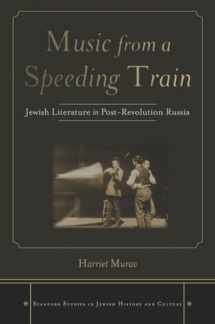
Music from a Speeding Train: Jewish Literature in Post-Revolution Russia (Stanford Studies in Jewish History and Culture)
ISBN-13:
9780804774437
ISBN-10:
0804774439
Edition:
1
Author:
Harriet Murav
Publication date:
2011
Publisher:
Stanford University Press
Format:
Hardcover
416 pages
FREE US shipping
Book details
ISBN-13:
9780804774437
ISBN-10:
0804774439
Edition:
1
Author:
Harriet Murav
Publication date:
2011
Publisher:
Stanford University Press
Format:
Hardcover
416 pages
Summary
Music from a Speeding Train: Jewish Literature in Post-Revolution Russia (Stanford Studies in Jewish History and Culture) (ISBN-13: 9780804774437 and ISBN-10: 0804774439), written by authors
Harriet Murav, was published by Stanford University Press in 2011.
With an overall rating of 3.5 stars, it's a notable title among other
books. You can easily purchase or rent Music from a Speeding Train: Jewish Literature in Post-Revolution Russia (Stanford Studies in Jewish History and Culture) (Hardcover) from BooksRun,
along with many other new and used
books
and textbooks.
And, if you're looking to sell your copy, our current buyback offer is $0.3.
Description
Music from a Speeding Train explores the uniquely Jewish space created by Jewish authors working within the limitations of the Soviet cultural system. It situates Russian- and Yiddish- language authors in the same literary universe―one in which modernism, revolution, socialist realism, violence, and catastrophe join traditional Jewish texts to provide the framework for literary creativity. These writers represented, attacked, reformed, and mourned Jewish life in the pre-revolutionary shtetl as they created new forms of Jewish culture. The book emphasizes the Soviet Jewish response to World War II and the Nazi destruction of the Jews, disputing the claim that Jews in Soviet Russia did not and could not react to the killings of Jews. It reveals a largely unknown body of Jewish literature beginning as early as 1942 that responds to the mass killings. By exploring works through the early twenty-first century, the book reveals a complex, emotionally rich, and intensely vibrant Soviet Jewish culture that persisted beyond Stalinist oppression.


We would LOVE it if you could help us and other readers by reviewing the book
Book review

Congratulations! We have received your book review.
{user}
{createdAt}
by {truncated_author}


